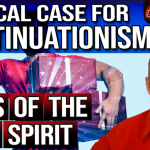A Biblical Case for Continuationism
Cessationists believe the miraculous signs and wonders more overtly supernatural, ended, or ceased, to be given by God to the church after the first century. As a continuationist, I believe all the spiritual gifts from the time of the apostles are still in operation today (i.e., they have continued).
Continuationism better explains the evidence of supernatural experiences throughout church history and within the contemporary charismatic movement. Cessationists often cite abuses, misuses, and potential harm of the gifts in contemporary practice, which I argue informs their hermeneutic, which seems to be merely presuppositions and eisegesis, masquerading as implicit exegesis of the Bible.
Regardless of the degree to which I share their concerns or cautions about modern misuses, or my positive experiences or preferences, Protestants hold to the principle of sola scriptura, meaning “by Scripture alone.” The Bible is our sole infallible source of authority for Christian faith and practice; we must allow it to determine where we stand.
Cessationism is based on two presuppositions and implicit eisegesis of the Bible, whereas continuationism is explicitly documented, assumed, and instructed in the Bible.
Cessationism is Based on Two Presuppositions and Implicit Eisegesis of the Bible
Since cessationism is not explicitly taught in the Bible, many cessationists build their case with two base presuppositions. The first assumes that it’s unnecessary, unhelpful, and even harmful to the church to have additional apostles or prophets throughout the entire church age. Second, they assume apostleship and prophethood are gifts, rather than roles, and since these ended, the other spiritual gifts may have ceased as well. A third assertion is that modern tongues, prophecy, healing, or exorcism are unlike those found in the Bible. However, belief in continuationism, based solely on sola scriptura, is not contingent on every or even most modern uses to be legitimate. Thus, this point is outside the purview of this paper and will not be covered.
Paul said the church is “built on the foundation of the apostles and prophets” (Eph. 2:20), and Jude said the church already had “the faith entrusted once for all to the saints” (Jude 3). So, we already have the gospel, the core tenets of the Christian faith, and much of their teaching in our Bible. Does it mean we no longer need apostles or prophets? Just because we have foundational truths doesn’t mean God can’t or won’t continue to add to or build upon that foundation. Moses laid the foundation that God created everything, that didn’t prevent Isaiah from expanding on that to teach that pagan gods weren’t gods at all. And this didn’t prevent Jesus from expanding on this to teach more about God the Father, fallen angels, end times, and trinitarianism. Just because we have all that we need for faith and life doesn’t mean that we can’t benefit from others coming after to continue to build onto the foundation. Progressive complementary revelation is the biblical pattern. Literally every historical creed, the five solas of the Reformation, and most secondary doctrines distinguishing denominations are like this, building upon the pre-existing foundation.
Tom Schreiner wrote, “We know that new apostles won’t appear since Paul specifically says he was the last apostle (1 Cor. 15:8).”1 But all Paul did was list himself last in a list of people he knows that Jesus appeared to. His list wasn’t exhaustive. It excluded the non-apostle Stephen who saw Jesus (Acts 7:56), and Ananias, who saw Jesus and was commissioned by him to go to Paul and restore his eyesight (Acts 9:10-17). Schreiner wrote, “Apostles… are restricted to those who have seen the risen Lord and have been commissioned by him, and no one since apostolic times fits such criteria.”1 But these criteria came from Peter, not God (Acts 1:21-22). And overlooked is the rest of Peter’s criteria, that Judas’s replacement had to follow Jesus from his baptism to his ascension, criteria by which neither Paul, nor even Peter himself would qualify for! The Bible never says the role of apostle ended, nor should we assume the role of prophet did as well.
Not only does the Bible not provide any evidence that these roles ended already, or even would or could end prior to the return of Christ, but it provides positive evidence for the fact that they will continue. Barnabas who, in addition to Paul, was also not of the original twelve, is called an apostle (Acts 14:14; 1 Cor. 9:6). There also continue to be multiple new prophets (Acts 11:27-28). Agabus was recognized twice as a prophet (Acts 21:10-11).
Paul writes in multiple places that both these roles are for the new covenant church age. 1 Corinthians 12:27-28 says, “Now you are the body of Christ, and each of you is a member of it. And in the church God has appointed first of all apostles, second prophets, third teachers, then workers of miracles” (italics mine). And in Ephesians 4:11-13 Christ “gave some to be apostles, some to be prophets, some to be evangelists, and some to be pastors and teachers, to equip the saints for works of ministry and to build up the body of Christ, until we all reach unity in the faith and in the knowledge of the Son of God, as we mature to the full measure of the stature of Christ” (italics mine). These roles are given by Christ to help the entire church until all its members reach unity and complete spiritual maturity into Christ’s likeness. Only by ignorance or presupposition would any Protestant conclude that this has been accomplished here in the twenty first century, much less by the church at the end of the 1st century, or by the completion of the canon in the 4th century. If the purpose for which these roles have been provided has yet to be finished, by logical necessity they must continue.
Remember though, the debate is not even about roles in the church, but spiritual gifts. But since the case for the cessation of spiritual gifts is not found in the Bible it must first find support by appealing to the cessation of the apostolic and prophetic roles (which are conveniently labeled as “gifts”). But since the Bible records regular non-apostle believers operating in the miraculous gifts, even if the roles hador would cease it still wouldn’t confirm that the gifts had or would. A biblical basis for these presumptions is untenable.
Continuationism is Explicitly Documented, Assumed, and Instructed in the Bible
Jesus inaugurated his ministry with miraculous signs and then gave this power and authority to the apostles (Luke 9:1). Then he extended this power to seventy others, setting the pattern for the church (Luke 10:1, 9, 17-20; 11:13). Jesus says signs will accompany his followers (Mark 16:17-18), and they would receive even greater power later (Acts 1:8), which of 120 included 108 non-apostles (Acts 2). Peter said this was for all people, both inaugurating the church age and characterizing it going forward (Acts 2:17-18). Other non-apostles or prophets exercising gifts include Stephen (Acts 6-7), Philip (Acts 8), Ananias (9), church members in Antioch (Acts 13), converts in Ephesus (Acts 19:6), and Philip’s four daughters (Acts 21:8-9).
Paul wrote instructive letters to four other churches with members exercising the gifts, including Galatia (Gal. 3:3-5), Rome (Rom. 12:6-8), Corinth (1 Cor. 12-14), and Thessalonica (1 Thess. 5:19-20). Peter said steward your spiritual gifts (1 Pet. 4:10). John said test the spirits and prophetic words (1 John 4:1-3). James said to pray and believe for healing (Jam. 5:14-16).
1 Corinthians 13:8-12 says the spiritual gifts will not “cease” until the “perfect” comes. This is the culmination of the age, when Christ returns, and we see him face to face. They will continue until then and as believers in sola scriptura we must be obedient to God’s Word, not quench the Holy Spirit (1 Thess. 5:19-20), and eagerly desire the spiritual gifts (1 Cor. 12:31, 14:1).
Want to learn more? Check out the full program that was live streamed on this topic:
https://youtube.com/live/WRzaGnGRLpE
[1] Schreiner, Tom (2014), para. 4. https://www.thegospelcoalition.org/article/cessationist/






